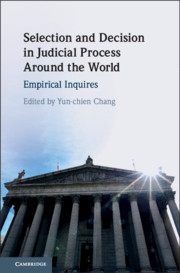
-
Select format
-
- Publisher:
- Cambridge University Press
- Publication date:
- 04 December 2019
- 19 December 2019
- ISBN:
- 9781108694469
- 9781108474870
- 9781009305785
- Dimensions:
- (228 x 152 mm)
- Weight & Pages:
- 0.55kg, 300 Pages
- Dimensions:
- (229 x 152 mm)
- Weight & Pages:
- 0.46kg, 314 Pages
You may already have access via personal or institutional login
Book description
This book empirically explores whether and under what conditions the judicial process is efficient. Three specific issues are addressed: first, disputants self-select into litigation. Do they tend to bring cases with merit? Second, filed cases differ in their social import. Do courts select more important cases to devote more resource to? Third, courts establish precedents, affect resource allocation in the cases at hand, and influence future behaviours of transacting parties. Do courts, like Judge Posner asserts, tend to make decisions that enhance allocative efficiency and reduce transaction costs? Positive answers to the above questions attest to the efficiency of the judicial process. What drive efficient or inefficient outcomes are the selections and decisions by litigants, litigators, and judges. Their earlier selections and decisions affect later ones. Eleven chapters in this book, authored by leading empirical legal scholars in the world, deal with these issues in the US, Europe, and Asia.
Contents
Metrics
Full text views
Full text views help Loading metrics...
Loading metrics...
* Views captured on Cambridge Core between #date#. This data will be updated every 24 hours.
Usage data cannot currently be displayed.
Accessibility standard: Unknown
Why this information is here
This section outlines the accessibility features of this content - including support for screen readers, full keyboard navigation and high-contrast display options. This may not be relevant for you.
Accessibility Information
Accessibility compliance for the PDF of this book is currently unknown and may be updated in the future.


